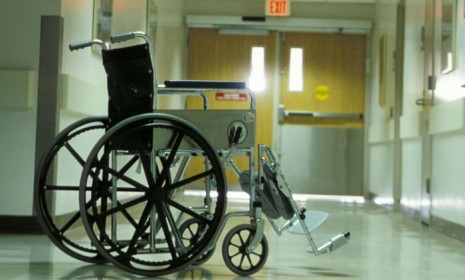Is America running out of doctors?
ObamaCare is set to expand the number of insured Americans, but an apparent shortage of doctors could make it difficult to treat them all

A free daily email with the biggest news stories of the day – and the best features from TheWeek.com
You are now subscribed
Your newsletter sign-up was successful
The primary objective of President Obama's overhaul of the health-care system is to extend coverage to the tens of millions of Americans currently without insurance. "But coverage will not necessarily translate into care," because there may not be enough doctors to treat everyone, say Annie Lowrey and Robert Pear at The New York Times. The U.S. is already facing a severe shortage of doctors, particularly in rural areas of the country, and the problem is only expected to get worse as more Americans gain insurance. Here, a guide to America's dearth of doctors:
Why aren't there enough doctors?
The pool of new doctors hasn't kept pace with several factors boosting the number of people seeking care: Population growth, the ObamaCare expansion, and an aging Baby Boomer generation that requires additional medical attention. Enrollment in Medicare, the government-run insurance program for the elderly, is expected to swell to 73.2 million in 2025, up from 50.7 million in 2012. Furthermore, the U.S. is facing an acute shortage of primary-care physicians, leaving many patients without access to general practitioners, pediatricians, family doctors, and other providers of basic medical care.
The Week
Escape your echo chamber. Get the facts behind the news, plus analysis from multiple perspectives.

Sign up for The Week's Free Newsletters
From our morning news briefing to a weekly Good News Newsletter, get the best of The Week delivered directly to your inbox.
From our morning news briefing to a weekly Good News Newsletter, get the best of The Week delivered directly to your inbox.
How will the shortage affect patients?
"A shortage of primary-care and other physicians could mean more-limited access to health care and longer wait times for patients," say Suzanne Sataline and Shirley S. Wang at The Wall Street Journal. The shortage will likely most affect those on Medicaid, the insurance program for the poor and disabled, since Medicaid's rolls are expected to expand significantly under ObamaCare. The shortfall of doctors could reach 100,000 by 2025. (There are currently about 1 million doctors in America.)
Why do so few doctors choose to go into primary care?
The main reason is money. Medical school graduates can expect to make an average of $3.5 million more over the course of their careers if they choose to enter a specialized field, such as anesthesiology or radiology. The difference in pay is enough that primary-care physicians carry a stigma within the medical community of being less talented and intelligent. The trend has huge implications for ObamaCare: "It is no exaggeration to say that the success of the health-care law rests on young doctors choosing to do something that is not in their economic self-interest," says Sarah Kliff at The Washington Post.
A free daily email with the biggest news stories of the day – and the best features from TheWeek.com
What can we do about it?
ObamaCare contains modest provisions increasing Medicaid primary-care payments and incentives for medical students to become primary-care physicians. The number of primary-care residencies climbed 20 percent between 2009 and 2011, but it's still not enough. Communities have been encouraged to create more walk-in clinics, and to allow more nurses to provide primary care. In addition, the U.S. could alter its immigration policies to attract doctors from overseas, "which should be very easy to do since doctors in the U.S. earn on average about twice as much as their comparably trained counterparts in Western Europe and Canada," says Dean Baker at Business Insider.
Sources: Business Insider, The New York Times, The Wall Street Journal, The Washington Post